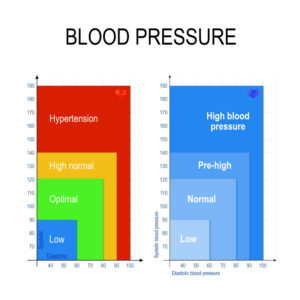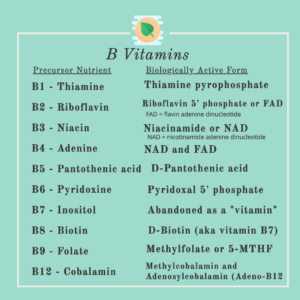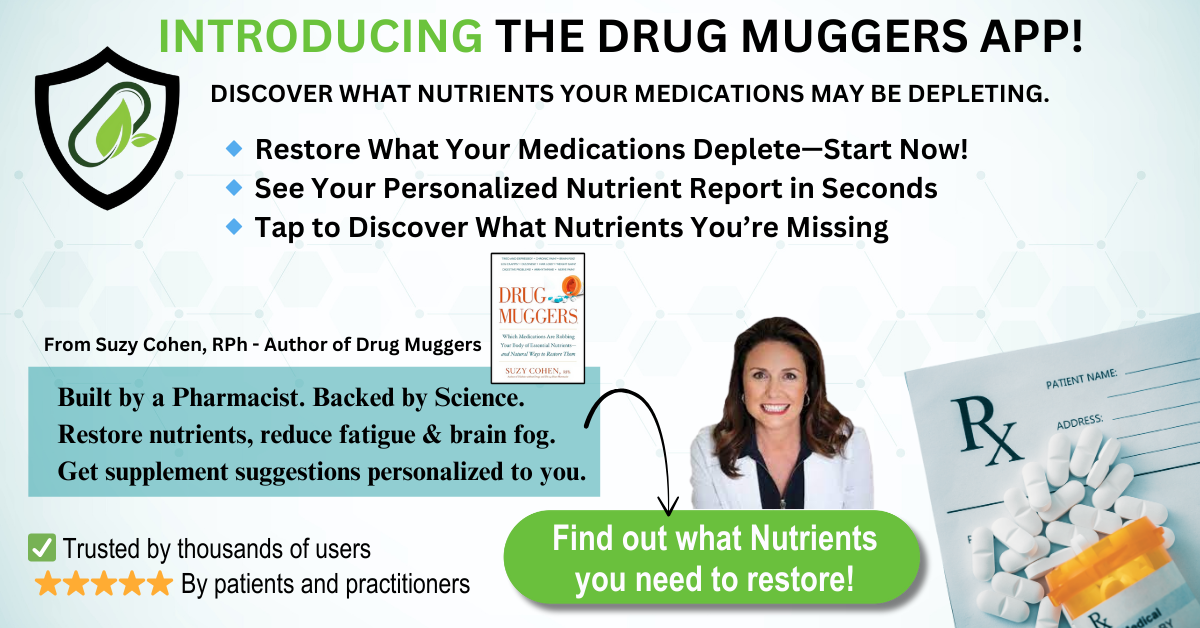What's On This Page?
ToggleIn today’s busy world, a lot of us depend on medications to manage chronic conditions and feel our best. But here’s something you might not know: some of those same medications – yes, even the ones keeping you upright – could be quietly stealing nutrients from your body. I call them “drug muggers,” and I wrote a whole BOOK about them because this side effect is wildly under-recognized.
If you don’t have time to read this blog, you can just start searching your medications – it takes 20 seconds. CLICK HERE
When nutrients get depleted by drugs, you can start feeling worse over time, not better (even if your lab numbers improve). Worse, the symptoms of nutrient deficiency can be so sneaky that they’re often misdiagnosed as brand-new health problems so you find yourself on new medications as the years go by because you suddenly have new “diseases.”
Were they really new diseases? Or could you have solved those symptoms for pennies a day by restoring what the medication was robbing from you. So again, you get more prescriptions, more side effects, new diseases requiring more medication… and the cycle never ends!
Let’s break it down and shine a light on how meds might be depleting your nutrients, and what you can do to take back control of your health.

What Are Drug Muggers, Anyway?
“Drug muggers” is the term I coined to describe medications that steal essential nutrients from your body. This can happen in a bunch of ways – they might block absorption, increase excretion of a nutrient, or interfere with how your body produces a vitamin or minerals.
This doesn’t mean you should toss your prescriptions. Meds have the ability to save lives. But it does mean we need to be more aware of what they’re quietly doing behind the scenes. If we ignore nutrient depletion, we risk developing fatigue, leg cramps, brain fog, anxiety, palpitations, weakness, insomnia or other issues that doctors might mislabel as brand-new diseases.
By understanding this connection, we can make smarter choices, like adjusting our diet, supplementing wisely, and talking with our practitioners about testing nutrient levels before starting new drugs for new diseases.
How Medications Deplete Nutrients
Here’s what’s happening under the hood:
- Some medications bind to nutrients, stopping them from being absorbed in your gut: Cholestyramine (a bile acid sequestrant used to lower cholesterol) is a perfect example. It binds to fat-soluble vitamins like A, D, E, and K in the intestines, preventing their absorption, leading to deficiencies of all those nutrients.
- Other medications change how much you excrete in urine or stool:
Furosemide (Lasix), a popular “loop” diuretic, causes you to urinate more (which after all is the goal for fluid retention or high blood pressure), but out with the pee gets flushed a lot of your magnesium, potassium, sodium, and calcium in the process. That’s why people on diuretics often need electrolyte monitoring. Deficiencies of those nutrients can lead to muscle cramps, insomnia, depression, and ironically high blood pressure!

- Some drugs disrupt how your body metabolizes or stores nutrients: Take metformin, a common medication for type 2 diabetes. It can mess with how your body absorbs vitamin B12, even if you’re eating plenty of it.Here’s how: your body needs something called “intrinsic factor” – a protein made in your stomach – that helps B12 get absorbed in the last part of your small intestine (called the ileum).
But metformin interferes with this process. It makes it harder for intrinsic factor and B12 to connect properly, which means less B12 gets into your bloodstream. Metformin is a drug mugger of B12.
To make things more complicated, metformin may also change your gut bacteria, allowing certain microbiome organisms to steal the B12 for themselves, leaving less for you. Over time, this can lead to a deficiency, especially in older adults or people who’ve been on the drug for years.
Here are some classic nutrient thieves:
- Antibiotics
- Acid blockers (PPIs and H2 blockers)
- Oral contraceptives
- Statins (for cholesterol)
- Blood pressure pills
The Hidden Side Effects Most People Miss
We tend to think of side effects as things that show up right away—nausea, headaches, maybe a rash. But nutrient depletion is slower and sneakier. It doesn’t scream. It whispers… until it shouts.
You might notice:
- Fatigue
- Muscle cramps
- Low mood or anxiety
- Memory issues or “brain fog”
- Hair loss or brittle nails
The problem is, these symptoms look like new health problems, so you might end up with another diagnosis – and another prescription – when what your body really needed was just magnesium, electrolytes, B12, or CoQ10. By the way, ubiquinol is the activated form of CoQ10.
Common Nutrients That Get Mugged by Drugs
Different medications deplete different nutrients. Here’s a cheat sheet of more than 3 dozen nutrients that could get zapped:
- B Vitamins – Depleted by hormone replacement, antibiotics, antacids
- Magnesium – Mugged by PPIs, diuretics, and stress
- Calcium – Lost due to corticosteroids and some antacids
- Iron – Blocked by NSAIDs and acid blockers
- CoQ10 – Drained by statins (this is a huge one!)
- Vitamin D – Impacted by some seizure meds
- Folate – Depleted by methotrexate and sulfa drugs
-

Foods high in zinc Zinc – Affected by ACE inhibitors and diuretics
And remember—some of these deficiencies can take months or years to show up, making it easy to miss the connection. I think people are actually healthier than they think they are – many are just medicating themselves repeatedly to solve a nutrient depletion. It’s a medication merry-go-round, and a hard ride to get off (until now, now you are informed and knowledgable).The Real-Life Health Complications You Could Be FacingWhen nutrients are depleted, the effects go beyond fatigue and leg cramps. Here are a few real-world examples of what can happen:
- Low CoQ10 from statins = muscle pain and weakness (READ THIS)
- Poor calcium and vitamin D absorption = osteopenia or depression
- Low iron or B12 = fatigue, hypothyroidism, tingling in the hands and feet
- Low zinc = weakened immunity, prostate enlargement, poor wound healing
These are serious issues that can be prevented when we pay attention to nutrient balance.
What Supplements Did for My Leg Cramps
Personally, I struggled with leg cramps for about 5 months right after my parathyroid glands were removed, and nothing helped, until I figured out the right formula. For me, the magic combo was:
- Two chelated magnesium capsules daily (from my own brand)
- Two calcium citrate with vitamin D (store-bought)
- One to two cups of unflavored Pedialyte drink (or a generic equivalent per day)
Why Pedialyte? Because without potassium, sodium, and zinc, your body can’t hang onto magnesium or calcium very well. You need those electrolytes to help the other minerals do their job. Think of minerals like a family—if you overload on just one or two, you can throw the others off balance, creating a relative deficiency. Once I added Pedialyte into my routine, the cramps didn’t just improve—they stopped. I share this because nutrient depletions are tricky. Sometimes one supplement does the trick, and sometimes, you need the whole family.Take B vitamins, for example. Yes, some medications are known to deplete folate and B12, and you could just replace those two. But doing that can cause you to become relatively low in the others, like thiamine, riboflavin, B6, pantothenic acid, and more. That’s why I always recommend a balanced B-complex, not megadoses of one or two Bs. Your body runs on synergy, not spot treatments.
How to Spot Nutrient Depletion in Your Life
Here are some signs you might be dealing with nutrient depletion (especially if you’re taking long-term meds):
- Feeling more tired than usual
- Noticing changes in mood or motivation (Find out how Homocysteine is Connected to Mood and Mental Health)
- Dealing with muscle weakness or twitches
- New or worsening brain fog
- Changes in your skin, hair, or nails
- Get a new (or odd) diagnosis 3 to 9 months after beginning a new medication
- You were medication-free for years, then started one new drug, and within 3 years find yourself taking 5 other drugs, wondering what the heck happened?!
These may look like random symptoms, but they’re not random at all. Your body is whispering. Are you listening?
What You Can Do About It
- Identify your drug muggers.
This step is so important, and I’ve made it easier than ever. After months of research (and more hours on my tush than I care to admit!), I’ve created an updated, easy-to-use resource at DrugMuggers.com. My original book came out 15 years ago, and this new tool brings everything up to date. Just make a list of everything you’re taking—including over-the-counter meds and supplements—and head over to the site to see which nutrients your medications might be mugging. It’s simple, fast, and incredibly eye-opening.
- Adjust your diet and supplements.
Once you know which nutrients are being mugged, you can start making smart changes to restore balance. That might mean adding more leafy greens, nuts, seeds, or a high-quality B-complex. For others, it may require targeted supplements—especially if the deficiency is more advanced. The good news? I’ve already done the homework for you. In the Drug Muggers app, I included popular foods rich in the exact nutrients being depleted by your meds, so you can nourish yourself naturally, one bite at a time. It’s all there—quick, simple, and super helpful.
- Work with your provider.
Bring your list of symptoms and meds to your next appointment. Ask about checking nutrient levels (especially magnesium, B12, and iron). Don’t be shy, this is your body, and you’re stuck in it dealing with multiple symptoms… you deserve answers. Please feel free to refer your physician to my website, drugmuggers.com, they will appreciate the site as it was built with clinicians in mind. I wrote clinical notes for every single medication. - Monitor over time.
 Nutrient levels don’t crash overnight—they deplete slowly, often over months or even years. That means healing takes time, too. Be patient with your body and celebrate the little wins along the way—more energy, fewer cramps, better sleep. These are signs you’re moving in the right direction. It’s also important to work closely with your healthcare provider. Ask your doctor about testing nutrient levels and whether new supplements can be safely added to your current regimen. My site is here to empower and educate – not to replace or interfere with your medical care. This is a team effort, and you’re in the driver’s seat.
Nutrient levels don’t crash overnight—they deplete slowly, often over months or even years. That means healing takes time, too. Be patient with your body and celebrate the little wins along the way—more energy, fewer cramps, better sleep. These are signs you’re moving in the right direction. It’s also important to work closely with your healthcare provider. Ask your doctor about testing nutrient levels and whether new supplements can be safely added to your current regimen. My site is here to empower and educate – not to replace or interfere with your medical care. This is a team effort, and you’re in the driver’s seat.Empower Your Health Journey
The takeaway? You are your own best health advocate. Medications are important, but they can come with hidden costs. Depletions occur whether you take the brand name, or the generic – it makes no difference.
By learning how to spot the drug mugger effect, and replenish what’s being lost, you can feel better, think clearer, and stay stronger – without adding unnecessary medications. I think of this new resource as your side effect solution. Here’s to protecting your nutrients, your energy, and your peace of mind, one smart choice at a time.

Suzy Cohen, has been a licensed pharmacist for over 30 years and believes the best approach to chronic illness is a combination of natural medicine and conventional. She founded her own dietary supplement company specializing in custom-formulas, some of which have patents. With a special focus on functional medicine, thyroid health and drug nutrient depletion, Suzy is the author of several related books including Thyroid Healthy, Drug Muggers, Diabetes Without Drugs, and a nationally syndicated column.



